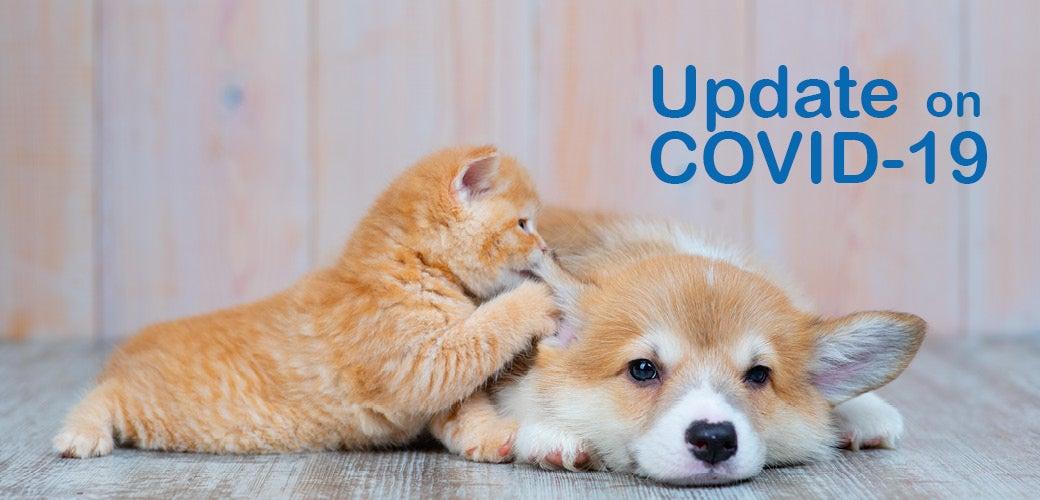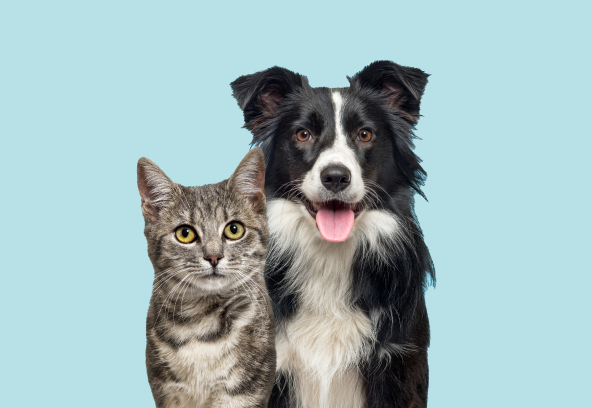
Update on COVID-19 and Your Pet

It’s been two years since COVID-19 appeared in New Zealand and pet owners continue to be concerned about the possible effects of the virus on their pets.
In addition, pet owners have also expressed some concern if pets can act as carriers of the COVID-19 coronavirus.
While COVID-19 is a continually evolving situation, with new variants of the coronavirus appearing at regular intervals, it is important to remain cautious and evaluate the facts available from informed and trustworthy sources.
No evidence pets spread COVID-19
According to the Companion Animals NZ website, updated in January 2022, “a small number of cats and dogs worldwide have tested positive for COVID-19. In all cases, it is suspected transmission occurred from a human to an animal.
“Occasionally companion animals infected with COVID-19 can develop symptoms, but these are generally mild and self-limited when they occur. There is no evidence that companion animals can spread COVID-19 to humans,” the organisation advises.
Additionally, the World Organisation for Animal Health states "...there is no evidence that companion animals are playing an epidemiological role in the spread of human infections of SARS-CoV-2. As a general good practice, appropriate and effective biosecurity measures should always be applied when people have contact with groups of animals e.g. in animal shelters. People who are suspected or confirmed to be infected with the COVID-19 virus should avoid close direct contact with animals."
The U.S. Centers for Disease Control and Prevention (CDC) says there have been reports of animals infected with COVID-19 around the world however, most of these animals became infected after close contact with people with COVID-19.
“We don’t yet know all of the animals that can get infected,” the organisation says. “Animals reported infected include: Companion animals, including pet cats, dogs and ferrets. Animals in zoos and sanctuaries, mink on mink farms and wild white-tailed deer in several U.S. states.”
The Australian Government Department of Agriculture, Water and the Environment adds that although genetic analysis suggests the virus that causes COVID-19 emerged from an animal source overseas, scientists are still studying this and there is no evidence that companion animals have spread the disease. They stress that human outbreaks are being driven by person-to-person spread.
How to protect your pet from COVID-19
The American Kennel Club has published some guidelines on how dog owners can protect their pets from COVID-19 if they themselves become sick and these common-sense steps could also apply to your cat, rabbit or horse.
- When possible, have another member of your household care for your pets.
- Avoid contact with your pet, including petting, snuggling, being kissed or licked and sharing food or bedding.
- If you must care for your pet, or be around animals while sick, wear a face mask and wash your hands before and after you interact with them.
Your pets are considered a part of your family and, should you become sick yourself, this 'part-of-your-family' approach can be applied in terms of how you interact with them. If you are isolating yourself from other members of your family, you should do this from your pets also - as difficult as that can be for both you and your pet, it may be better to be safe than sorry!
Companion Animals NZ adds that if you’re isolating at home, you should treat your pets as part of your isolation bubble. You should not leave your house to exercise your dog and, if you’re sick and can’t look after your animals or are admitted to hospital, arrange for someone to look after them.
Vets are considered an essential service
Veterinary care is considered an essential service and is available regardless of vaccine status. However, clinics may ask to see your My Vaccine Pass before allowing you entry onto their premises. In this case, contactless services should be available for unvaccinated people. Face coverings will be required and be sure to sign in using the COVID Tracer App.
Pick up of your pet will need to be contactless, with appropriate social distancing and hygiene measures.
The evidence strongly suggests there is no need to panic and fear for our, or our animal's health, as a result of the COVID-19 coronavirus, as long as we take adequate precautions. Stay safe and protect your wellbeing by following guidelines from the authorities and other trusted health advisors.
And, as always, if you have any concerns about your pet's health, consult your vet for expert advice.

